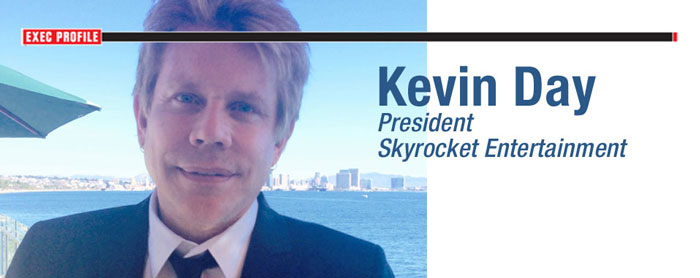
BACKGROUND
A veteran of the major label system, Kevin Day made the best of a bad situation when Geffen let him go amid a downsizing frenzy. Instead of despairing, he founded Rocket Science, an all-in-one services company for artists. Skyrocket, the most recent incarnation of that organization, has elevated digital solutions into a primary component.
Skyrocket In Flight
I was a musician and wanted to be a rock star, but I didn’t have perspective on the machinery of the business. That changed when I worked in retail. During college, I managed a series of stores for a chain that existed until the late ‘80s, called Licorice Pizza. [That’s when] I became interested in the business of music.
I worked at Universal for under 12 years. I started at MCA and ended up at Geffen and Interscope Records. I was head of sales at Geffen by the time I left in late 2004. When I was downsized, all the majors were shedding talent. If a band sold less than 250,000 units, they were off the roster. These were the bands I worked with, and I had a vision of creating Rocket Science to become an outsourced, label services company for major label artists still releasing product, albeit independently.
For ten years, that’s what we have done. We provide [anything], whether it’s a publicist, a marketing director, digital marketing or distribution. We’re one of the first into that space and we’re able to work with a broad array of major label artists that no longer had a home.
Services Go Digital
The downsizing and changes in the music business caught up with Rocket Science. We had enormous problems, many based on physical returns through our distribution deal. The path onward from 2011 has been redesigning the services model to define what a services provider means. When I started Rocket Science, services often meant physical sales, somebody who knew people at Target and Best Buy and could get you an end cap positioning. In the era we’re in now, services are more or less online-based—how to get on Pandora.
Fan Funding
We work closely with PledgeMusic and do fan-funding campaigns for almost all our releases. This allows us to pre-sell a record, raise capital for marketing without having to take advances or borrow money from a distributor. Many of our artists have existing fan bases, so fans buying something premium—an expanded edition, a VIP pass—allows us to provide funding to market records, which makes everybody happy. The fan gets something special, and nobody’s in debt.
Radio Riddle
We haven’t managed to get our arms around providing a radio solution in-house. It’s intangible and can easily be an expensive part of a project with the least amount of return. Therefore, it’s difficult to offer to a client. When we do offer radio, it has to be outsourced. With budgets being what they are and radio being what it is, it’s not something we can [provide].
Scalable Solutions
Our strongest suit is a marketing plan, building a team and executing on behalf of an artist’s project. We’re usually compensated either on a retainer or a percentage basis, depends on the project and artist. [We have] four [staff] right now and myself, so five total. Up until 2012, we had a dozen in-house. Production and physical sales was four of the 12. It’s been difficult to redesign and rescale. Oftentimes, five is the perfect size for a project, but there are cases where we’ll sub-contract in another partner.
Hired Gun
This year, we did a six-month contract with Warner and Rhino where we worked out of their building and executed marketing plans for many records. We became an in-house adjunct marketing staff where we handled all their B-level releases. Their staff was at a place where it was overwhelmed, and we were able to handle it all.
Jaco
We’re working with a talented guy, [Metallica bassist] Rob Trujillo, on a movie he’s made. It’s a documentary about jazz musician Jaco Pastorius. We’re involved with the movie and the audio release, and we’re running a fan-funded campaign. This has turned into a broad-reaching project that we’ll still be involved in next year.
Build Your Machine
It’s difficult to provide services for an artist unless there is some traction. To make a difference—something that shows up on a P&L, something you’re making money from and isn’t just you writing checks—you need to have built a machine that generates traction. When there’s nothing to start with and limited to no touring history, you’re not ready. You’ve got to build the machine to a point where you’re ready to invest in it and add gasoline.
First, Define Success For Yourself
What is successful? What do you want to achieve? Do you want to tour your project and make a few bucks? Do you want to debut at No. 1 on Billboard? What do you hope to achieve, realistically?
Blazing a Trail
When I started this in 2005, there was no one else providing a complete label solution in-house as an independent entity—that was a trailblazing idea. As distribution companies have downsized, they have tried to reinvent themselves as service providers.
As far as a standalone company that provides label services like this, there are very few. There’s a company in the triple-A country world called Thirty Tigers. There’s a company that does a good job in the urban and hip-hop world called RBC. We are the rock/alternative component of that sort of platform.
Walk Before You Run
Don’t hire anybody until you’ve made a record and devised a plan. Eight out of ten times, I’ll get involved with a project and they say, “We’ve already hired a radio guy. And we haven’t finished the record.” Well, what’s he doing? You’re putting out press releases about a record that won’t come out for six months. Slow down and get a cohesive plan together about what comes first and what comes second. Oftentimes, artists or managers are in a hurry to spend money and make something happen.
Especially now, you have to have a concise, well-executed and thrifty plan. Do not spend money until there’s a return. Oftentimes, [artists] want to throw gasoline on the fire; they get a little spurt, but then all the money’s gone. That’s not a great way to burn through a release budget. And then you think, “Holy cow, now what do we do?” or you get airplay but don’t sell any records. It doesn’t connect to retail or digital in any way. There’s no connection for whatever reason and then the airplay’s gone, nothing’s sold and the budget’s empty.
When Technology and Marketing Collide
I would like to push into more tech services. To get involved in providing more services that are tech-leaning—interacting more with streaming services and marketing through streaming platforms. This is the next wave of marketing—the ability to place similar artists together visually or audio-wise within video or audio streamers. That’s the next phase for us.











